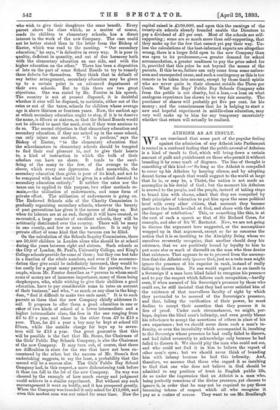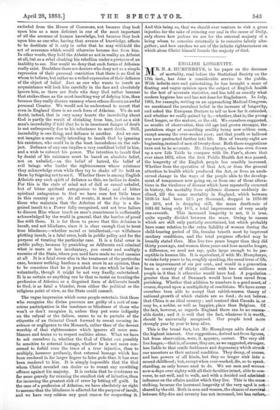ATHEISM AS AN INSULT.
WE are convinced that some part of the popular feeling against the admission of any Atheist into Parliament is rooted in a confused feeling that the public avowal of Atheism is a kind of insult to God, which will bring down a certain amount of guilt and punishment on those who permit it without branding it by some mark of disgrace. The line of thought is something of this kind So long as the Atheist is compelled to cover up his Atheism by keeping silence, and by adopting decent forms of speech that would suggest to the world at large that he is, or may be, a Theist, the nation is not made an accomplice in his denial of God ; but the moment his Atheism is avowed to the people, and the people, instead of taking steps to brand him with shame, admit that they are compelled by their principles of toleration to put him upon the same political level with every other citizen, that moment they become parties to the insult levelled at God, and share with the atheist the danger of retribution.' This, or something like this, is at the root of such a speech as that of Sir Richard Cross, for example, and also of Sir W. Barttelot. Now, we are not going to discuss the argument here suggested, or the assumptions wrapped up in that argument, except so far as concerns the notion that it is so insulting to the Almighty Being whom we ourselves reverently recognise, that another should deny his existence, that we are positively bound by loyalty to him to put some slur or mark of discredit on the man who thus denies that existence. That appears to us to proceed from the assump- tion that the Atheist only ignores God, just as a rude man might ignore the presence of his superior in rank, instead of really failing to discern him. No one would regard it as an insult to a Sovereign if a man born blind failed to recognise his presence and to pay the respect which follows such recognition,—hardly even, if when assured of his Sovereign's presence by those who could see, he still insisted that they had never satisfied him of the existence of that marvellous faculty of sight by which they pretended to be assured of the Sovereign's presence, and that, failing the verification of their power, he must decline to accept their assertion that they possess it in lieu of proof. Under such circumstances, we might, per- haps, deplore the blind man's infirmity, and even gently blame his reluctance to accept the assertions of others in place of his own experience ; but we should never deem such a man's in- firmity, or even the incredulity which accompanied it, insulting to the Sovereign whose presence he had really failed to discern, and had failed reverently to acknowledge only because he had failed to discern it. We should pity the man who could not see, and who could not find it in him to believe the report of other men's eyes ; but we should never think of branding him with infamy because he had this infirmity. And, therefore, we assume that those who regard it as insulting to God that one who does not believe in God should be admitted to any position of trust in English public life, do so under the impression that an Atheist is a man who, being perfectly conscious of the divine presence, yet chooses to ignore it, in order that he may not be required to pay those becoming tokens of respect which all who recognise it pay as a matter of course. They want to see Mr. Bradlaugh excluded from the House of Commons, not because they look upon him as a man deficient in one of the most important of all the avenues of human knowledge, but because they look upon him as one who, having that avenue of knowledge, affects to be destitute of it only in order that he may withhold the act of reverence which would otherwise become due from him. In other words, they hold the Atheist as not in reality an Atheist at all, but as a rebel cloaking his rebellion under a pretence of an inability to see. Nor would we deny that such forme of Atheism really exist. Doubtless there are deniers who deny not as a simple expression of their personal conviction that there is no God in whom to believe, but rather as a veiled expression of their defiance of the object of belief. Just as one who wants to insult an acquaintance will look him carefully in the face and absolutely ignore him, BO there are Sufis who deny God rather because that strikes them as the most insulting way of defying him, than because they really discern vacancy where others discern an awful personal Creator. We would not be understood to assert that even in England there is no such form of Atheism. We de not doubt, indeed, that in very many hearts the incredulity about God is partly the result of shrinking from him, just as a sick man's incredulity if told that he is in imminent danger of death is not unfrequently due to his reluctance to meet death. Still, incredulity is one thing, and defiance is another. And we can- not imagine a man really intending to insult God by ignoring his existence, who could be in the least incredulous on the sub- ject. Defiance of any one implies a very confident belief in him, and, a wish to subvert his power. The intention to insult God by denial of his existence must be based on absolute belief, not on unbelief, —on the belief of hatred, the belief of evil beings who loathe the righteousness whose existence they acknowledge even while they try to shake off its hold on them by feigning not to see it. Whether there is among English Atheists any such spirit of defiance as this, we incline to doubt. For this is the state of mind not of dull or carnal unbelief, but of bitter spiritual antagonism to God ; and of bitter spiritual antagonism to God we have seen but little trace in this country as yet. At all events, it must be obvious to those who maintain that the Atheism of the day is a dis- guised insult to a Power folly recognised, and not true failure to discern Him whose touch on men's consciences is sufficiently acknowledged by the world in general, that the burden of proof lies with them. It is for them to prove that this Atheism is insult, and not blindness, since it is clear enough that to treat true blindness,—whether moral or intellectuat—as wilfulness plotting insult, is a fatal error, both in public policy and for the purpose of treating the particular case. It is a fatal error in public policy, because by punishing as deliberate and criminal what is more or less involuntary, you create and multiply enemies of the State, where you need have made no real enemies at all It is a fatal error also in the treatment of the particular case, because nothing hardens a man more in an opinion, than to be conscious that he is punished for one which he had in- voluntarily, though it migtt be not very fixedly, entertained. It is as certain as anything can be that to insist on treating the profession of Atheism as a disguised form of deliberate insult to God, is as fatal a blunder, from either the political or the religious point of view, as the State could commit.
The vague impression which some people entertain that those who recognise the divine presence are guilty of a sort of con- scious participation in the insolence or blindness of those who won't or don't recognise it, unless they put some indignity on the refusal or the failure, seems to us to partake of the etiquette of an Oriental Court forward to resent seeming in- solence or negligence to the Monarch, rather than of the devout worship of that righteousness which ignores all mere sem- blances and trains us to respect realities alone. What we have to ask ourselves is, whether the God of Christ can possibly be sensitive to external homage, whether he is not more con- cerned to forbid even the . trace of a true injustice, than to multiply, however profusely, that external homage which has been rendered in far larger degree to false gods than it has ever been rendered to him. It is simply impossible that the God whom Christ revealed can desire us to resent any unwitting offence against his majesty. It is certain that he condemns us far more gravely for running the smallest risk of injustice, than for incurring the greatest risk of error by letting off guilt. In the case of a profession of Atheism, we have absolutely no right to assume that the blindness is affected for the purpose of insult, and we have very seldom any good reason for suspecting it. And this being so, that we should ever venture to risk a gross - injustice for the sake of evincing our zeal in the cause of Deity, only shows how jealous we are for the external majesty of a being whom to conceive externally is to conceive falsely alto- gether ; and how careless we are of the infinite righteousness on. which alone Christ himself founds the majesty of God.



































 Previous page
Previous page